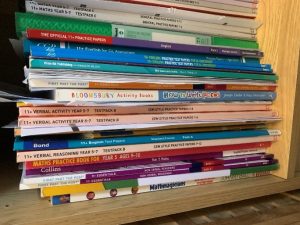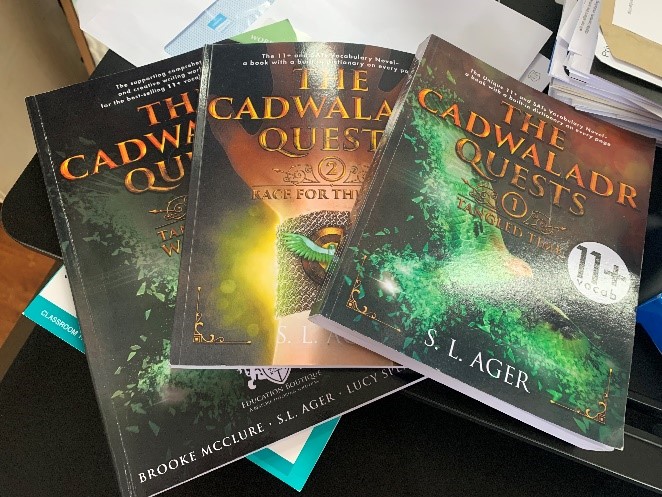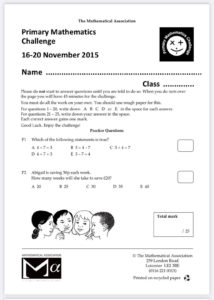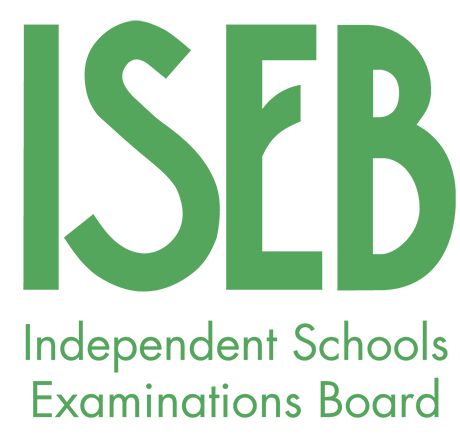Guest post by Tony Thomas.

My daughter recently prepared for the 11+ entrance exams across a variety of grammar and independent schools (Feb 2020-Jan 2021, for entry in Sep 2021). While there are (quite literally) a ton of resources and guides out there for prospective parents and their wards, I thought it might help to share our personal experience in the hope it benefits others preparing their wards for the same journey. At the very least, it may serve to jog my memory a few years hence when my younger daughter gets old enough to prepare for the same exams!
Philosophy and approach to the exams
My one overarching goal throughout had been to make sure that this exam prep does not become a source of stress for my daughter. From my professional experience, I am acutely aware of the stress that children experience and the effect this could have on their future development … and that was even before we factor in the lockdowns and assorted troubles of the pandemic. It is common in our area (Harrow) and elsewhere throughout the UK to send children for tuition classes for 11+ prep, sometimes starting as early as when the children are in Year 3. We started prep in Feb 2020 when she was in Year 5.
We decided that she would limit her preparation to what she could do at home, at a pace driven by her and supported by me whenever needed. It was important to let her take ownership of both the time and the space in which to prepare. She worked out a schedule for daily revision built around her other activities and family commitments both on weekdays and weekends. We made a few changes to her small study space to create the right environment in which to concentrate. Some simple things helped a lot – a corkboard where she could pin up tricky formulae and guides, a table with bookshelf to organise her materials, and (later) headphones when she realised listening to music helped her focus while doing revision. (A similar space was set up for her younger sister in another room just to ensure there would be no competition!)
Many people approach the 11+ preparation process with a target school or schools in mind, and some prep sites/experts also recommend this. I don’t buy it. I wanted my daughter to focus on learning/strengthening the basics and to realise that the competitive 11+ exams were merely an opportunity to broaden her range of choices for this next stage in her education. My daughter currently attends a state primary school in Harrow, and we are fortunate that many of the state secondary schools in our neighbourhood are rated “good” or “outstanding”. The secondary school she attends would just be one factor among many that influence her future success and happiness, though certainly an important one. We visited a couple of secondary schools in the area (pre-pandemic, late 2019) and attended a few virtual open days, primarily to get familiar with the ways in which schools differed but stayed away from naming a target school.
We focused on celebrating the process rather than the outcomes. She was free to relax however she wanted after her daily study time. We tried to encourage her to think about her approach to tricky questions without bothering about marks obtained in individual mock papers or in practice exercises. After each 11+ exam (whether onsite or online) we had a mini-celebration with her favourite takeaway food and board games or a movie.
Getting familiar with the curriculum
I started off by ordering a few bond books and others by the author Robert Lomax, covering the four subject areas – Maths, English, Verbal and Non-Verbal Reasoning. This was quite eye-opening as I quickly realised that I had no idea what was in the syllabus. I took a step back to read about the various options. The grammar schools tend to choose either GL or CEM, while independent schools vary widely, though they all tend to base their syllabus on what is covered in KS2. Sample papers are available for free download from many schools, usually to be found in the admissions section of their websites.
While some online sites appear to accentuate the differences between the exam formats, it became clear that the syllabus was really quite similar across all the formats. This reinforced my decision not to anchor on any particular format and instead just make sure that she had a thorough understanding of the basic building blocks in each of the subjects. This paid off later, when some schools – in the shift to computerised exams later in the year – needed to switch their preferred formats to ISEB Pre-Test and others.
Building momentum and settling into a rhythm
We started trying the mock papers and practice exercises in the books but soon realised she needed help to ensure regularity and rhythm to the practice sessions. That search led me to RSL 11plus Lifeline. The Silver subscription for £15 a month gave us two papers every week covering the complete range of subjects, in most cases those used in earlier exams from schools throughout England. The papers arrived every Tuesday evening and it became routine to do them over the next few days. The answers were explained well, and we found them quite sufficient.
A friend whose daughter had completed the 11 + in the previous year from a nearby tuition agency gave us a range of books – these served as a thorough source for targeted practice of particular question types as targeted practice is important to help build patterns of thinking about the questions, and not just in NVR where there isn’t even a clear syllabus.
The rhythm she settled into included more than half of hour of independent work almost every day, with about an hour on most weekends. She sustained this for much of the Mar-Dec preparation period. Being in lockdown helped in the beginning months and later it became part of her routine even when school started and time pressures increased. I usually sat with her only either at the beginning to review theory or at the end to discuss answers to the questions she struggled with.
Sustaining interest and thinking beyond the exams
One of my worries was that this exam preparation would become very narrowly focused, and so the knowledge gained might not be retained beyond the exams. At the same time, looking over the various test materials, I had to agree with her that sometimes the practice questions were quite repetitive and boring!

For English, I found an exciting resource in The Cadwaladr Quests by S L Ager. This series of two books with one workbook (now 3 books with more workbooks) embeds 11+ vocabulary into an exciting adventure story. Every page has extensive footnotes that provide word definitions along with their synonyms and antonyms, all in context. She read these books first as an exciting story and then returned to them multiple times for revision. This proved to be so much more interesting than the other options I looked into – such as word card sets and the like!

Creative writing was an area where her state primary school teacher had done a great job, particularly with the use of the DADWAVERS technique. While thinking about how I might support this and encourage her writing in the future, I saw a recommendation for Descriptosaurus by Alison Wilcox. It goes far beyond a dictionary or a thesaurus to organise words along different themes, such as scenes in nature, emotions, and so on. For each word it provides the expanded meaning in various contexts and suggests alternatives with illustrative example phrases. This is one book that I hope she will continue to use for years to come.

For Maths, the Primary Maths Challenge site supplied some great resources. This is an annual series of challenges organised by the Mathematical Association aimed at students in Years 5/6 (in England, with equivalents elsewhere) and is designed to make students think outside the box. Past papers are available for free download from the site. Questions are within the Maths syllabus taught in KS2 and have been designed to encourage creative problem-solving. My daughter enjoyed trying the quirky questions even when she initially got many of them wrong – since then we could together step through the detailed and interesting alternate approaches to get to a solution.
Adjusting to online and computer-adaptive tests

With the first lockdown easing up in September, the first exams were in person at the school (grammar school exams tend to be at the start of the term while most independent/private school exams are in Nov/Dec). Soon however, with the pandemic raging again the schools had to shift to computer-based exams (adaptive tests such as the ISEB and CEM Select) or completely online exams taken at home (using Microsoft Teams).
Mindset for the interviews
The key message we tried to convey here was that it was a two-way selection – the schools would ask questions to select the students they wanted, and she would have the opportunity to ask questions to select the school that was best for her. To prepare she viewed the school admissions videos, and we spent time discussing activities that were important to her such as drama and swimming. She was also encouraged to make notes about each school to record her impressions.
Selecting the school that’s right for her, and right for her family
In the beginning, I tried to identify a set of schools purely based on convenience. With a younger daughter still going to a school nearby, we were unable to move house. I returned to a site I had used several years earlier to find the primary school my children currently go to – Locrating. This aggregator site does a great job of combining school results, admissions profiles, catchment information, travel time from different locations, etc in an easy-to-search map. The Sunday Times Parent Power reviews and Good Schools Guide were also helpful in learning more about the different schools. Individual school sites were best for up-to-date information on facilities and travel arrangements.
This helped us narrow the list to two grammar schools and four independent schools ain our neighbourhood that had school bus routes coming near the house. This was an important consideration to manage the inevitable and unrelenting morning chaos with both parents working and the two children going to different schools!
We were very pleasantly surprised by the results in mid-Feb – she got a good rank at a leading grammar school and was offered a place at all the independent schools she applied to, many of them with academic scholarships! This left us with a rather difficult though happy choice, and I was keen again that she took ownership of the decision. We prepared a table that combined elements that we parents thought were relevant – academic rating, travel time, quality of facilities, career development support, etc – with factors that she considered important: impressions from viewing the videos, discussions with staff and students during the interviews/open days, availability of options for her interests (swimming and drama), and so on. We took well over two weeks just discussing the options before we all felt comfortable with her final selection, St Helen’s in Northwood (it came down to the scholarship offered, convenience of travel, new STEM facilities, and an excellent range of sports/extracurricular activities including with a nearby boys’ school).
Reflections on the process
I hope that some of the links here will be helpful to other parents who are considering how best to prepare their children for the 11+ exam (if they choose to do it). I realise that not everyone will have the luxury of spending time to prepare children on their own as I was able to. The pandemic might actually have helped by reducing the physical burdens of the usual tuition system.
It is also encouraging that many top universities are looking to recruit widely beyond what were considered “feeder schools” in the past. The exam process is an anachronism – or one hopes it will soon become one – as it is quite unfair to measure children’s ability just on their performance in a small range of exams. Whether with parental or expert support, those less privileged than us would struggle to access the time and resources needed. However, while we still have the exams, I hope this article helps you consider the diverse options available to help prepare your children for the exams … and beyond. All the best!
Tony Thomas


Enjoyed reading your experience Tony, thanks for sharing and congratulations to Amelia. Well done!
Excellent support to children who study and return excellent results , setting an example for others. Expect more such real life experiences which really motivates. The very thought of sharing the real life experience is commendable.